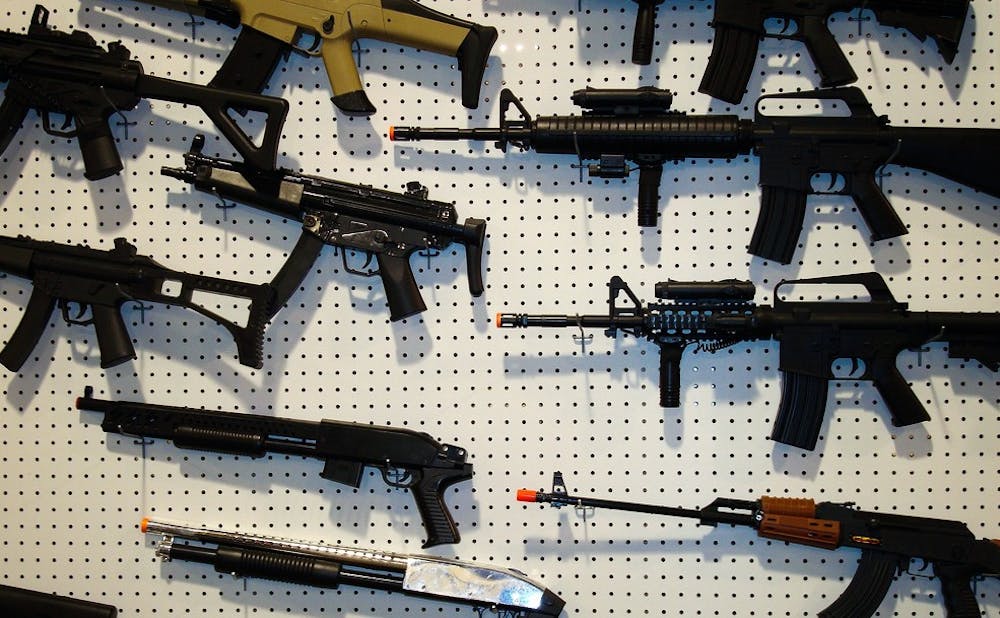Headlines depicting gun violence seem to be commonplace nowadays. New research from a Duke professor lends insight into how the underground gun market contribute to these incidents.
Every year, more than 10,000 Americans are killed by gun homicides, but most happen through attacks like armed robberies and assaults, not mass shootings. Philip Cook—ITT/Terry Sanford professor emeritus of public policy—and Harold Pollack—Helen Ross professor in the School of Social Service Administration at the University of Chicago—edited seven articles that show the importance of curbing the underground gun market that illegally supplies firearms to dangerous offenders. Although most guns are purchased legally at first, many are resold on illegal markets to gang members and convicted felons.
Published in The Russell Sage Foundation Journal of the Social Sciences, the studies by experts in the field examined both the legal and illegal gun markets by drawing information from datasets and interviewing inmates. Cook explained that they attempted to show everything currently known about the underground gun market.
“Our question was, how do these gang members and other dangerous people get their guns?” he said. “I think the answer that we found looking at a number of different studies is that they get most of their guns through their social network.”
Pollack explained that in addition to the work in the RSF, he and Cook also collaborated on a project examining the Cook County Jail in Chicago and the Illinois prison system in general. They asked inmates about how they got their guns, how they carried them and why they felt the need to own a firearm.
About 40 percent of people they interviewed had been shot during their adult lives, making owning guns a necessary part of survival.
“There’s a sense that all these guys are armed up because they’re scared of each other,” Pollack said.
Cook explained that few dangerous individuals buy guns from gun stores, steal the weapons or shop on the Internet for them. Most make connections with people they know and trust when they want to buy a gun.
These transactions are often illegal because the purchasers are too young or have felony convictions or a serious criminal record that would bar them from going to a licensed dealer to buy the weapon.
In the United States, 55 million adults own almost 270 million guns in private circulation, providing a large reservoir from which criminals can obtain firearms.
Cook noted that the question now is how to reduce the underground gun market. He often hears people say that it’s useless to try to keep guns away from dangerous people because are there so many in the United States.
“My response would be an analogy with cars,” he said. “There’s a couple hundred million cars, but not every 14-year-old who wants a car has immediate access to one. There has to be some kind of illegal transaction.”
The underground gun market is similar to that for prescription opioids—there are many avenues to acquire the product, so there is no one bottleneck to close down, Pollack noted.
Strengthening the background check system and increasing worries about the punishment for carrying a gun illegally are key to curbing the market, he said.
“We need a portfolio of efforts that add up to something that changes that personal cost-benefit calculation that a person goes through when they ask if they want to be carrying this gun,” Pollack said.
Cook explained that his surveys have found that the time between getting a gun and using it in a crime is typically very short. If there is any hope in stopping violent crimes, the focus should be preventing guns from moving into the hands of gang members and criminals.
“It’s helpful to regulate guns,” Cook said. “States where there are no regulations on gun transactions have a harder time keeping the guns away from dangerous people.”
He also noted the importance of police not just arresting robbers and shooters but investigating how they got their guns. In many high-crime areas, police are so focused on arresting and prosecuting that they don't make these investigations a priority.
“It’s not very exciting,” Cook said. “In the eyes of the courts and what they’re dealing with, it’s a relatively minor crime.”
However, he said police should take the idea of the social network seriously and look for ways to put legal pressure on it. Providing someone with a gun illegally is a victimless crime until that individual uses it in a violent act.
Cook said that studying the underground gun market is important because it can help reduce the high murder rate in the United States, which he attributed to the large number guns in the country and how easy it is to get them.
If there is a fight or robbery, the likelihood of someone dying is much higher if a gun is involved, he said. In addition, impulsive suicides are more likely to be completed if there is a gun easily available.
“Making guns harder to get is not going to affect the crime rate very much, but it will affect the murder rate and the consequences of violent crime,” he said.
Pollack explained that the United States has a level of crime that is similar to other nations but with many more deaths resulting from it. In his opinion, there is no more important question of public safety than reducing gun violence.
“Many gun offenders themselves would like for us to get a handle of this,” he said. “They’re carrying guns because everyone else is.”
Get The Chronicle straight to your inbox
Signup for our weekly newsletter. Cancel at any time.

